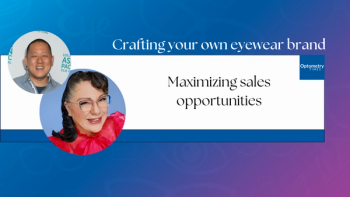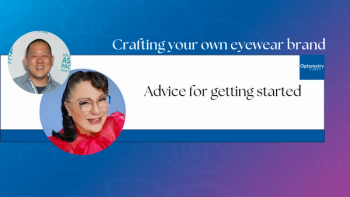
Did I choose optometry, or did optometry choose me?
Sometimes people ask me, “How did you choose optometry?” Considering all of the close encounters I had with eyecare professionals in my youth, you’d think my career choice would have been as definitive as a Blake Griffith slam dunk. But that’s not the way it happened.
Sometimes people ask me, “How did you choose optometry?” Considering all of the close encounters I had with eyecare professionals in my youth, you’d think my career choice would have been as definitive as a Blake Griffith slam dunk. But that’s not the way it happened.
My career as a patient
In fourth grade, the school nurse conducting the vision screening looked at me and said, “You failed.” It was a poor choice of words. I’d never failed anything in my life, and she made me mad. But by the time I saw the young ophthalmologist my parents took me to, I’d settled down. He reassured me that soon I would be able to “see the leaves on the trees,” and he was right-even if I did look like a chubby Buddy Holly in a polyester leisure suit.
A few years and several diopters later, I’d taken up tennis. I blamed my weak second serve on the way my glasses fogged with sweat and slipped down my face. My idol Arthur Ashe had ditched his heavy plastic frames for contact lenses by then, so I begged my parents for a pair and promised them a cut of my future professional winnings.
This time they took me to an optometrist. She was very nice, and she practiced in an office with a green sign on the outside that said, “Pearle Vision.” She told me that I had this disease called “astigmatism” and that the soft contact lenses I was dead set on wouldn’t cure it. “Everything will be blurrier than with your glasses,” she warned.
But I didn’t care. The way I looked at it, I didn’t need to read the writing on the ball-I just needed to get it over the net and between the lines.
By the time I was a freshman in college, I had graduated to hard, PMMA contact lenses. They felt like rocks at first, but once the oxygen deprivation kicked in, it wasn’t so bad. I saw great with them. I played tennis, ran, swam, and waterskied in them, all without losing a single one. But one day when I was coming out of chapel into the bright sunlight, I blinked a little too hard, and out popped one like a watermelon seed pinched between your fingers.
The sidewalk was packed with students, so I screamed “EVERYBODY STOP! I’VE LOST MY CONTACT!” and held out my hands like Moses parting the Red Sea. To my amazement, it worked. Several people got down on their hands and knees to help me look. Despite the bad odds, a pretty coed in a nice-fitting pair of Calvin Kleins called out, “Found it!”
She handed it to me, but I had hardly muttered “Thanks,” before she took off faster than Joan Jett (I think she was a senior). I “reconditioned” it with a little saliva, popped it in my eye, and off I went to microbiology.
A few referrals later
One morning during my senior year, I woke up with a “gnat” in my vision. Alarmed, I found an optometrist in the small, Arkansas town where my college was located. He listened to my story, but then apologized and said, “I know what’s wrong with your eye, but I’m not allowed to use drops to dilate them. I’ll need to send you to a retinal specialist in Little Rock.”
I can’t say that I enjoyed that particular encounter. The ophthalmic assistant dilated my eyes with drops that stung like fire and then had me lie down on a table with a tiny pillow barely big enough for my head. After a long wait, the retinal specialist blew through the door and proceeded to poke me in the eye with a metal thimble and torture me with a bright light and magnifying lens, like I was some kind of poor, unfortunate ant.
“Don’t worry,” he said when he was done. “It’s just vitreous floaters. No big deal.” He couldn’t have known at the time how much they would come back to haunt me someday.
The summer before I was to start graduate school in clinical psychology, I worked construction. I went to a different optometrist back in Virginia to get my contact lenses updated. I heard him inhale sharply when I was in the slit lamp. “You have a piece of metal in your eye! Do you not feel that?” (See previous comment on oxygen deprivation.)
He probably could have taken it out, but state law didn’t permit it at the time. The ophthalmologist who did took about five seconds. I remember thinking, “What was the big deal?”
Finding the right path
Graduate school in clinical psychology wasn’t for me. All that yackety yack-I decided I wanted to work with my hands and see the results of my work more clearly. But I didn’t have a clue what I was going to do.
I moved back to Arkansas to be near my fiancée who was finishing up college and to sort things out. One day, I asked my construction boss if I could take the afternoon off to go to the career library to find out “what I wanted to do with my life.” I had already decided that it shouldn’t include picking clumps of brick mortar out of my hair.
It was there that I picked up a pamphlet published by the American Optometric Association and read about a career in optometry. It seemed like a good fit and a nice blend of my interests in psychology and medicine. After about 15 minutes, I put it down and said, “That’s it. That’s what I’m going to do.”
I’ve told that story to students over the years, some of them third-generation ODs-to-be who were born with ophthalmoscopes in their hands, and their jaws have dropped. Their faces say it all: “How could anyone choose something as important as a career in 15 minutes?”
A few years ago, I was sorting through some old papers, and I found a career interest inventory that I had taken at some point during my freshman year of college. At number two on the list of “best careers” for me was psychologist. At number one? Optometrist. It had been right there before my eyes the whole time, but I just didn’t see it.
Looking back, the real question might be “Did I choose optometry, or did optometry choose me?
Newsletter
Want more insights like this? Subscribe to Optometry Times and get clinical pearls and practice tips delivered straight to your inbox.













































